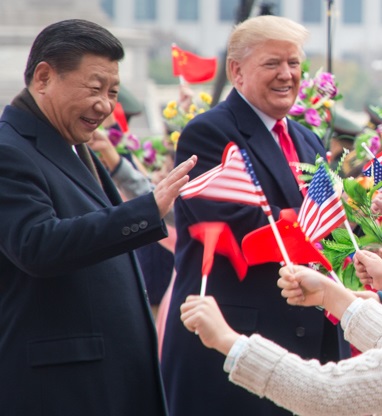Trump is playing a short game, and China is (as always) playing a long game.

Donald Trump and Xi Jinping, November 2017. Image from
Wikimedia Commons.
A trade war is when a country raises tariffs (taxes) on a product coming into the country. The business selling that cheaper foreign product then has to pass that tariff (tax) onto the consumer, and this can make the product cost the same as an American-made product.
Big retailers like Walmart and Target have been lured to China to produce their goods. They’ve invested billions in creating a manufacturing infrastructure. The Chinese provided Special Economic Zones where U.S. capitalists could build factories, hire workers at low wages, and the workers even agreed to a no strike pledge. The only hitch in all this was that the Chinese government owned 52% of the factory.
Lenin said: ‘The Capitalists will sell us the rope with which we will hang them.’
Lenin said: “The Capitalists will sell us the rope with which we will hang them.”
China has gone a step further. They convinced U.S. capitalists to give them the factories with which they will compete with the U.S. for markets in Asia, Europe, Africa, and South America. The U.S. gave them the factories and showed them how to run them.
The most far-reaching and profound development in international trade hasn’t been Trump’s Trade War, it’s been the opening of China’s New Silk Road or Belt and Road Initiative. In 2013 Xi Jinping announced a bold plan to link China to the rest of the world through new highways, harbors, and airports. They’re sponsoring a $68 billion China-Pakistan Economic Corridor linking China to Pakistan’s Gwadar Port on the Arabian Sea.
They’ve already spent more than $200 billion on infrastructure projects in 150 countries, and the final bill will probably be in excess of $1.5 trillion.
So, what happens to those Chinese-owned factories in a trade war?
So, what happens to those Chinese-owned factories in a trade war? If they manufacture drill bits, and the U.S. tariffs on Chinese-made drill bits goes up by 25%, then it’s easy for American consumers to switch over to U.S.-made drill bits. And it feels patriotic. And Trump can claim victory by saying he’s saving American jobs. And the Chinese factory will have to find other customers for its drill bits.
The New Silk Road and Belt and Road Initiative connects that product with new customers. Customers who had been purchasing a product with a U.S. brand (for products that were probably manufactured in China) will welcome the same product with a Chinese brand at a lower cost. And the tariffs will cause the U.S. corporation to stop production at its Chinese factory, but the Chinese factory will keep on producing and exporting and supplying the customers that once bought the U.S. products. The result will be that U.S. corporations will lose their international trade and go bankrupt which could cause a complete collapse of the Stock Market.
Trump believed trade wars were easy to win.
And all because Trump believed trade wars were easy to win. He was playing a short game, and China was (as always) playing a long game. The objective of Eastern martial arts is to allow your opponent to make a mistake by attacking you. Let him lunge at you. Step back. Defend yourself. Be calm and wait it out.
A protracted trade war with China will not hurt China. China already owns the factories and knows how to run them. That’s why Xi rejected the latest negotiations and broke off the talks. Trump immediately increased tariffs on another $200 million of Chinese imports, further raising prices to U.S. consumers and further damaging the manufacturing arm of U.S. corporations. The longer this goes on, the more the U.S. will suffer, and the more China will take over U.S. customers in Asia, Europe, Africa, and South America.
And Trump still believes he can bully China into submission. He’s saying, “If you don’t give up, I’ll punch myself in the other eye.”
[Ed Felien is publisher and editor of Southside Pride, a South Minneapolis monthly, and a contributor to The Rag Blog.]
- Read more articles by Ed Felien on The Rag Blog.


















I recently re-read a great article, “One Belt, One Road,” by four Chinese scholars at Chinese universities (Monthly Review, January 2017). They unabashedly identify their own country’s economy as “state capitalism . . . with the capacity to shape and lead a global system of finance and trade. Of course, in the foreseeable future, China will not replace the US dollar system . . . After the United States overtook the United Kingdom to lead the world in industrial production capacity in the late 19th century, it took another 50 years and two world wars before it could dominate global finance. China recognizes this reality . . .”
So, as you say, China is indeed taking the long view. But also, we can forget about China advancing socialism – though I imagine a lot of people will disagree with me on that.
Trump says, “trade wars are good, and easy to win.”
In picking a fight with China he is picking on a country that has a 2000 year history of trade with foreign countries. Trump thinks bully, bluster and bluff are enough. He’s very wrong. It has to do with who owns the means of production.
And, in another irony of history, the glorious artistry of the Ming Dynasty in China reached its apex with the building of the Great Wall in 1644 at a cost of thousands of lives to keep back the Manchurian barbarians. Then, as soon as the Wall was built, they invited the Manchurian army into China to defeat some radical peasants who wanted a say in running the government. The Manchurians stayed, made peace with the rebels and established the Manchurian or Qing Dynasty that lasted from 1644 to 1912.
So much for walls and bad intentions.